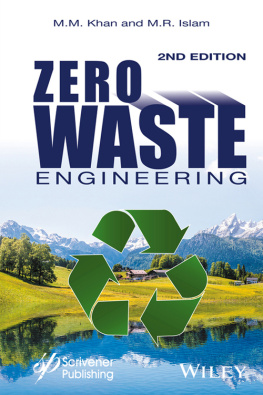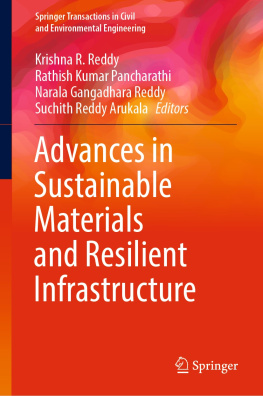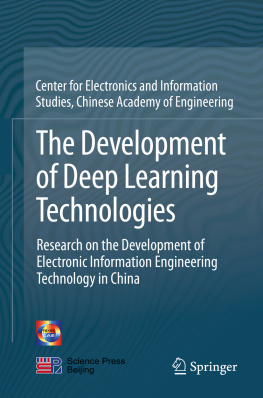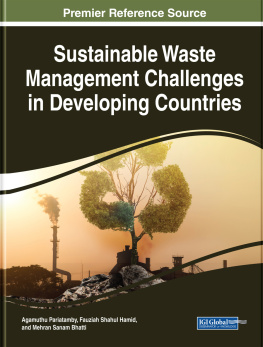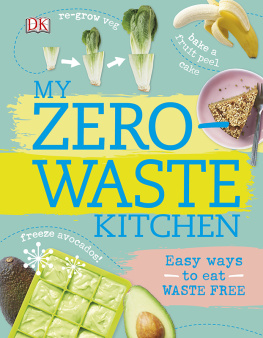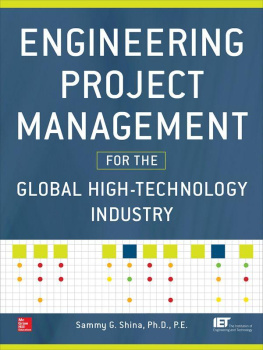Contents
Guide
List of Tables
- Chapter 1
- Chapter 2
- Chapter 3
- Chapter 4
- Chapter 5
- Chapter 6
- Chapter 8
- Chapter 9
- Chapter 10
- Chapter 11
- Chapter 12
List of Illustrations
- Chapter 1
- Chapter 2
- Chapter 3
- Chapter 4
- Chapter 5
- Chapter 6
- Chapter 7
- Chapter 8
- Chapter 9
- Chapter 10
- Chapter 11
- Chapter 12
- Chapter 13
Pages

Scrivener Publishing
100 Cummings Center, Suite 541J
Beverly, MA 01915-6106
Publishers at Scrivener
Martin Scrivener()
Phillip Carmical ()
Zero Waste Engineering
A New Era of Sustainable Technology Development
Second Edition
M.M. Khan
University of Alberta
M.R. Islam
Emertec R&D Ltd. and Dalhousie University
Copyright 2017 by Scrivener Publishing LLC. All rights reserved.
Co-published by John Wiley & Sons, Inc. Hoboken, New Jersey, and Scrivener Publishing LLC, Beverly, Massachusetts.
Published simultaneously in Canada.
No part of this publication may be reproduced, stored in a retrieval system, or transmitted in any form or by any means, electronic, mechanical, photocopying, recording, scanning, or otherwise, except as permitted under Section 107 or 108 of the 1976 United States Copyright Act, without either the prior written permission of the Publisher, or authorization through payment of the appropriate per-copy fee to the Copyright Clearance Center, Inc., 222 Rosewood Drive, Danvers, MA 01923, (978) 750-8400, fax (978) 750-4470, or on the web at www.copyright.com. Requests to the Publisher for permission should be addressed to the Permissions Department, John Wiley & Sons, Inc., 111 River Street, Hoboken, NJ 07030, (201) 748-6011, fax (201) 748-6008, or online at http://www.wiley.com/go/permission.
Limit of Liability/Disclaimer of Warranty: While the publisher and author have used their best efforts in preparing this book, they make no representations or warranties with respect to the accuracy or completeness of the contents of this book and specifically disclaim any implied warranties of merchantability or fitness for a particular purpose. No warranty may be created or extended by sales representatives or written sales materials. The advice and strategies contained herein may not be suitable for your situation. You should consult with a professional where appropriate. Neither the publisher nor author shall be liable for any loss of profit or any other commercial damages, including but not limited to special, incidental, consequential, or other damages.
For general information on our other products and services or for technical support, please contact our Customer Care Department within the United States at (800) 762-2974, outside the United States at (317) 572-3993 or fax (317) 572-4002.
Wiley also publishes its books in a variety of electronic formats. Some content that appears in print may not be available in electronic formats. For more information about Wiley products, visit our web site at www.wiley.com.
For more information about Scrivener products please visit www.scrivenerpublishing.com.
Library of Congress Cataloging-in-Publication Data:
ISBN 978-1-119-18489-8
Preface
The modern age is synonymous with waste and environmental destruction. Every day, we see on television and the Internet or read in the newspaper about companies destroying natural habitats, humans creating potentially disastrous climate change, and frittering away our natural resources, all in the name of progress. If we are unsatisfied with this state of the earth, we should be thinking of a fundamental change in this centuries-old practice. Yet, any process that can trigger a paradigm shift has been shunned by the establishment, citing numerous excuses. How then we could come up with such a huge step that challenges engineering practices of centuries, going back to the time of Sir Isaac Newton? It needs a description of the background.
Nearly two decades ago, when western society was first looking into the prospect of 0% interest in the form of sales of cars by dealers (now known as no-interest financing), dealers faced an interesting dilemma. The computer programs would blow up by the fact that a 0% interest rate ends up with division by zero in at least one place during the calculation of the monthly payment. Thankfully, dealers did not call this an absurd concept and resorted to putting a number (often 0.1%) and give back that sum upfront to the buyer. It was remarkable that no one recalled the prediction of catastrophic failure of the Islamic banking system (that also operates at 0% interest) when the Islamic Republic of Pakistan first introduced it in our own time. Of course, both Islamic banking and 0% interest rates are quite fashionable these days even when war on terror rages on. On the consumer side, that computer glitch of the 90s dealers has been fixed and 0% interest rate, and even cash back, is a routine.
In 2001, when our research group, Energy, Environment, Communication (EEC) launched a series of ground-breaking or absurd ideas (depending on which side of the conscience spectrum one is). To us (a group of 30+ researchers from among students and professionals), it was the only conscientious to advance a theme that we saw as correct and beneficial. The theme was: long term over short-term, others over self, and intangibles over tangibles. This translates into developing technologies that in Canadian Minister of Public Safety and Emergency Preparedness, Ralph Goodales word (when he was the NRCan Minister) are (paraphrased): technologically innovative, environmentally appealing, socially responsible, and financially attractive. In laymans term, it meant: 0% interest for the economy, 0% waste for engineering, and 0% income tax. We published the first of them in our book: Economics of Intangibles (Gary Zatzman and Rafiqul Islam, Nova Science Publishers) in 2007. This work on economics had to be done before we could talk about science and engineering, because we like it or not, Economics is the driver of this society. However, we didnt talk about 0% interest, but expounded the idea in a 400 page book. However, when it came to zero-waste, we didnt hide the theme, we added the name on the title of the book and published it in 2010. Even though, the world was waking up to the concept that there is nothing better than green technology, to many the concept of zero-waste in engineering was an oxymoron. After all, we have learned about the value of waste-intensive engineering that cashes in on our wasteful lifestyle. However, the logic of the concept was impeccable and the deconstruction of Newtonian mechanics (that fueled linear thinking in the west) was flawless. By then, we have completed the science of Greening of Petroleum Operations (Scrivener-Wiley, 2010) as well as the mathematics of Intangibles (Advanced Reservoir Simulation, Scrivener-Wiley, 2010), therefore, we were able to base the engineering on a dogma-free science. Once the engineering was completed with examples of calculations and the results were matched with flawless continuity and economics of intangibles, critiques were silenced.
The central theme of the original zero-waste engineering book was that sustainability lies within nature, and only nature.

